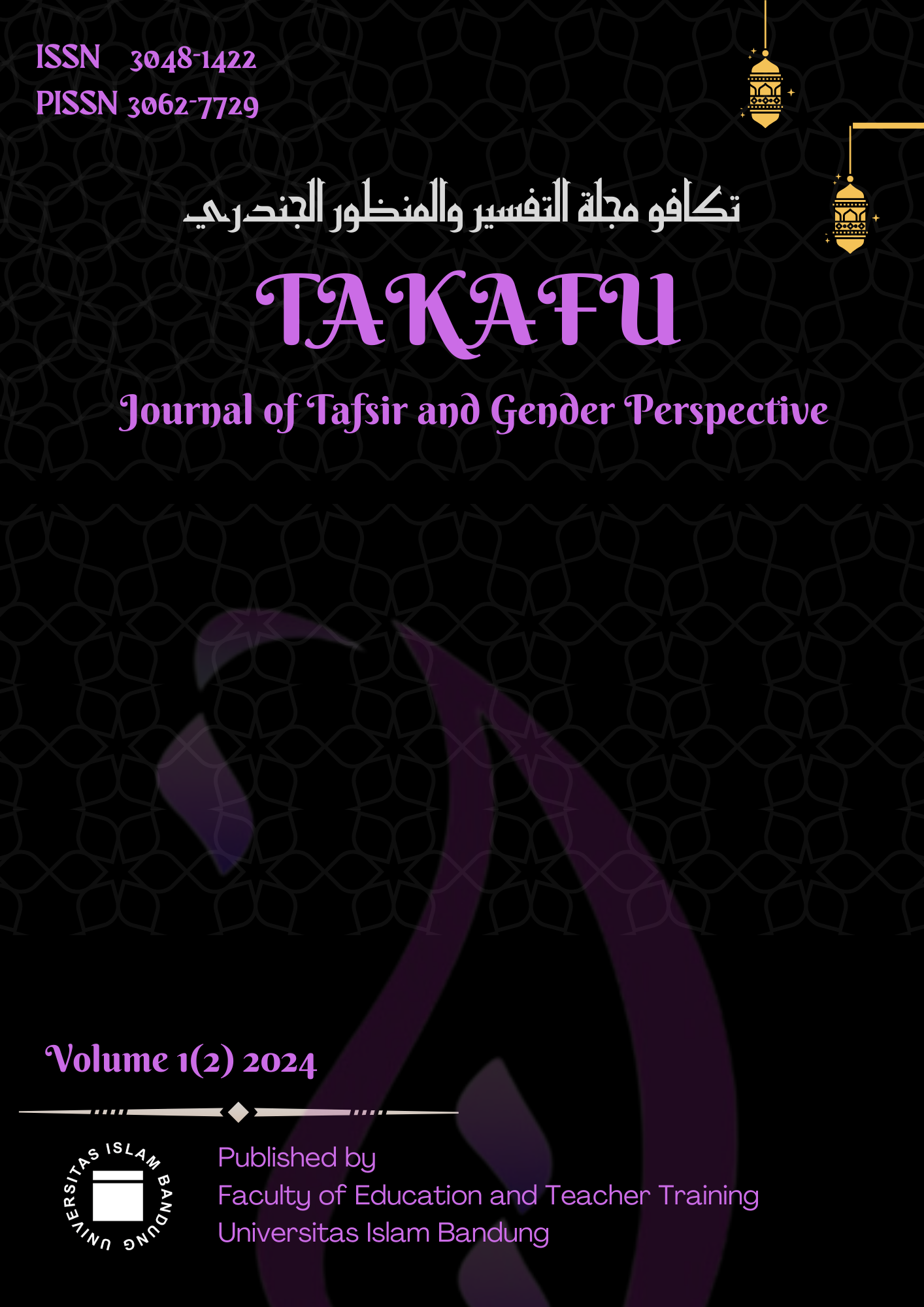DISCOURSE ON THE DISTRIBUTION OF INHERITANCE FOR WOMEN
A CRITIQUE OF THE INTERPRETATION OF SURAH AL-NISĀ' VERSES 11 AND 176
DOI:
https://doi.org/10.29313/takafu.v1i2.4110Keywords:
Distribution Concept, Inheritance, Criticism, InterpretationAbstract
The legal issue of the distribution of inheritance for women with a ratio of 2: 1 which is stated in the Qur'an Surah Al-Nisā' verses 11 and 176 reaps many pros and cons in its interpretation. This is evidenced by many writings and books written by Muslim scholars to express criticism of interpretation and perspective in examining the law contained in the inheritance verse. The phrase equality and justice led to the issue of equal distribution of inheritance between men and women. This was pioneered by feminists. Through this, it appears that the distribution of inheritance for women needs to be studied further. The focus of the study of this paper is how to criticize the interpretation of the mufasir scholars on the inheritance verse of surah Al-Nisā' verses 11 and 176. By using a qualitative approach and library research method, this study shows that the law of inheritance distribution received by women has received a lot of criticism both pro and con from the scholars of interpretation. This study shows that those who are in favor of the distribution of women's inheritance with a ratio of 2: 1, namely Muhammad Abduh, Tabatabai, and Muhammad Syahrur with their maximum limit theory. Those who are against and have new ideas are Amina Wadud and Munawir Sjadzali.
References
Ahmad Saifuddin, W. (2020). Hak waris perempuan dalam perspektif surat Al-Nisā’ antara teori, praktek dan relevansinya dalam konteks ke-Indonesiaan. Jurnal Tafsir Hadits STIU DARUL HIKMAH, V(1), 45–59.
Arifin, M. P. (2019). Penafsiran Kontekstual Kesaksian Perempuan. Musawa: Journal for Gender Studies, 9(1), 105–128. https://doi.org/10.24239/msw.v9i1.402
Aziz, D. A. (2024). Feminist Activist’s Interpretation of the Inheritance Vers: Siti Musdah Mulia and Amina Wadud Thoughts on QS. Al-Nisa/4: 11. Takafu: Journal of Tafsir and Gender Perspective, 1(1). https://doi.org/10.29313/takafu.v1i1.3619
Fakhyadi, D. (2021). Patriarkisme Hukum Kewarisan Islam: Kritik Hukum Waris Islam dan Kompilasi Hukum Islam. Hukum Islam, 21(1), 30–44.
Ikhwanudin, M. (2023). PENERAPAN KESETARAAN GENDER DALAM SISTEM PEMBAGIAN WARIS BERDASARKAN HUKUM ISLAM DI INDONESIA. Jurnal Syntax Idea, V(I), 1–19.
Nada Rahmatina. (2024). WOMEN’S TESTIMONY IN THE QUR’AN IN ASGHAR ALI ENGINEER’S PERSPECTIVE: PAUL RICOEUR’S HERMENEUTIC PHENOMENOLOGICAL READING. Takafu: Journal of Tafsir and Gender Perspective, 1(1). https://doi.org/10.29313/takafu.v1i1.3624
Ninik Qori’atul Muslimah. (2018). Konsep Pembagian Waris Menurut Muhammad Syahrur Dan Kompilasi Hukum Islam (Vol. 7). IAIN Ponorogo.
Permana, S. (2018). Kesetaraan Gender Dalam Ijtihad Hukum Waris Di Indonesia. Asy-Syari’ah, 20(2), 117–132. https://doi.org/10.15575/as.v20i2.3210
Sistem Pembagian Harta Waris 2:1 Antara Anak Laki-Laki Dan Anak Perempuan (Studi Komperatif Pemikiran Muhammad Syahrur Dan M. Quraish Shihab), 7823.
Sri Aelis Zulfahnur. (2020). EKSISTENSI PEREMPUAN SEBAGAI AHLI WARIS DALAM PERSPEKTIF AL-QUR’AN (STUDI KOMPARATIF ATAS PEMIKIRAN MUHAMMAD ABDUH DAN M. QURAISH SHIHAB). UIN Alauddin Makassar.
Sukarti, D., & Asyari, H. (2023). Legal Education on Women’s Property Inheritance Rights in South Sumatera. Ahkam, 23(2).
Syahabuddin Yahya. (2022). HERMENEUTIKA AMINA WADUD TERHADAP AYAT WARIS. In Institut PTIQ Jogjakarta (Issue 8.5.2017). Institut PTIQ Jogjakarta.
Vivit Vitriana. (2020). Pembagian Waris 2: 1 Bagi Ahli Waris Laki-Laki Dan Perempuan Dalam Al-Qur’an (Studi Komparatif Tafsir Ibnu Katsir Dan Amina Wadud). IAIN Purwokerto.
Wahidah, W. (2022). Kasus Kewarisan Istimewa Gharawain Ditengah Isu Keadilan Gender. ADHKI: Journal of Islamic Family Law, 3(2), 15–27. https://doi.org/10.37876/adhki.v3i2.53
Zulaiha, S. (2013). HAK WARIS BAGI WANITA/PEREMPUAN DALAM PERSPEKTIF HUKUM ISLAM DAN HUKUM POSITIF. Yin Yang, 8(2), 83–98.
Downloads
Published
How to Cite
Issue
Section
License
Copyright (c) 2024 Asfa Kurnia Rachim, Nurul Afifah

This work is licensed under a Creative Commons Attribution 4.0 International License.









